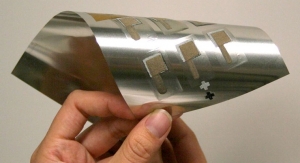David Savastano, Editor07.10.12
For a printed electronics system to be fully functional, a source of power has to be included. Ideally, a printed battery will be thin, flexible, low cost and utilize non-toxic materials. It should also be customizable into any shape.
Imprint Energy, a start-up out of the University of California at Berkeley, is achieving all of these goals for its Zinc PolyTM printed batteries. The company’s energy dense batteries are also rechargeable, and are expected to have a lifetime comparable to Li-Ion counterparts.
|
|
After winning several business plan competitions, Kincaid and Dr. Ho incorporated the company in 2010 and successfully raised seed capital from Dow Chemical's venture group. Shortly afterwards, Imprint Energy’s original strategic advisor, Dr. Devin MacKenzie, formerly of Add-Vision, Inc., joined the company full-time as CEO to help Kincaid and Dr. Ho navigate the university to market scale-up process and build a product and technology plan.
With Dow's initial investment, significant customer-funded development projects and several research grant awards, Imprint Energy has been able to grow to a full-time staff of eight employees and establish its own research laboratory, where the company is working to further develop and scale Dr. Ho's battery innovations.
Kincaid said that Imprint Energy is pioneering battery technology that will redefine the limits of portable power across a broad capacity range.
|
|
“We also see printed electronics/micropower applications as an interesting, emerging market opportunity and are developing partnerships in the space.” Kincaid added. “The company's focus is on scaling to cover the broadest range of applications and developing its Zinc Poly batteries to satisfy the energy, cost and design needs of the ‘Device Swarm’ – a fast-growing ecosystem of high functioning, small form factor electronics devices, including portable electronics accessories, medical devices, health and fitness monitoring devices, other wearable technology, printed electronics devices and other compact wireless devices. We are particularly excited to see applications emerging in the wearable and medical arenas as those applications may bridge the micropower and small portable electronics markets.”
Imprint Energy has made several notable advancements in the field of printed batteries. The most notable is the development of a low cost, fully printable, solid-state rechargeable battery.
“The stability of our Zinc Poly battery cells, which enables a reduction in packaging, is significant as other printed battery solutions typically require substantial battery cell packaging for protection,” Kincaid said. “This added packaging reduces these batteries' effective areal and volumetric energy density. In addition, the full printability and patternability of Imprint Energy’s battery cells can be done using low-cost, ultra-thin battery manufacturing processes that will offer new freedom to design thin, printed and truly flexible electronic devices in various shapes and sizes.”
Kincaid noted that Imprint Energy’s proprietary Zinc Poly battery technology represents an electrochemistry breakthrough.
“It removes fundamental limitations on the rechargeability of zinc-based batteries and offers energy density, cost and form factor advantages over conventional incumbent rechargeable battery manufacturers,” said Kincaid. “Zinc polymer batteries’ inherent multivalent energy storage potential, stability and safety reduces the need for packaging and other inactive materials which sap the practical storage capacity of other battery technologies for portable power applications. Furthermore, the materials set is inherently safe, low cost to acquire and process, and is earth abundant.”
Imprint Energy has already received investment and development funding from interested customers, suppliers and partners. The company has a well-publicized partnership with Thin Film Electronics ASA to develop battery technology for use with Thin Film's printed memory, sensor and logic technologies. The company has additional undisclosed relationships aimed at developing the Zinc Poly battery technology for larger capacity, non-printed electronic device applications. IT also was honored during LOPE-C 2012 with the LOPE-C Investor Forum Award 2012 for Most Impactful Technology/Product.
Kincaid noted that Imprint Energy is currently focused on further developing and characterizing its battery technology, while building its team and IP portfolio.
“The goal for this phase of our company's development is to achieve market-leading battery energy densities with high production yield, identify a market entry customer and prepare to scale manufacturing,” Kincaid concluded. “Imprint Energy has secured investment, development projects and research grants to fund a majority of this 12-18 month stage of its development, but is open to discussing opportunities with new partners and investors.”
















